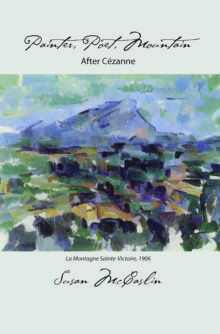Painter, Poet, Mountain: After Cézanne
Painter, Poet, Mountain: After Cézanne re-enacts a journey to Aix-en-Provence in 2013, where the poet found herself in a “heart-soul-mind-clench” with the post-Impressionist painter Paul Cézanne. Her book traces how the artist accompanied her home to the Fraser Valley outside Fort Langley, British Columbia, where she gazed through his eyes to see afresh the trees and landscapes near her home. Readers may be surprised to discover the impact of Cézanne’s achievement on later poets, philosophers, and writers, the enormity and enduring quality of his legacy. Read as a whole, this book suggests that Cézanne was an early deep ecologist.
Moving easily between her life as a pilgrim in Aix-en-Provence and Cézanne’s as a native, between her life as a poet and his as a painter, Susan McCaslin writes into the experience she inventively calls “interbeing.” The result is a multilayered exfoliation of Cubism like waves reaching shores or shores meeting waves.
—E.D. Blodgett, author of Apostrophes: Woman at a Piano
Like much ekphrastic work, these Cézanne poems serve as an ars poetica, an interrogation and a celebration of the artistic process. The poems’ lively engagement creates an immediacy that arises from and transcends layers of description, interpretation, and imagination. These contemplative, often playful poems are written to and from “the field / of the inner eye / (where things commune).”
—Stephanie Bolster, author of A Page from the Wonders of Life on Earth
Susan McCaslin’s restless poetic lines straddle the page like thin rope ladders across a bottomless canyon of silence, regret, wonder and longing. Cezanne’s life and work becomes a rich metaphor of multidimensional possibilities in a fraught world: “The pines / a dizzying galaxy / along the road.”
—Di Brandt, author of Walking to Mojácar









